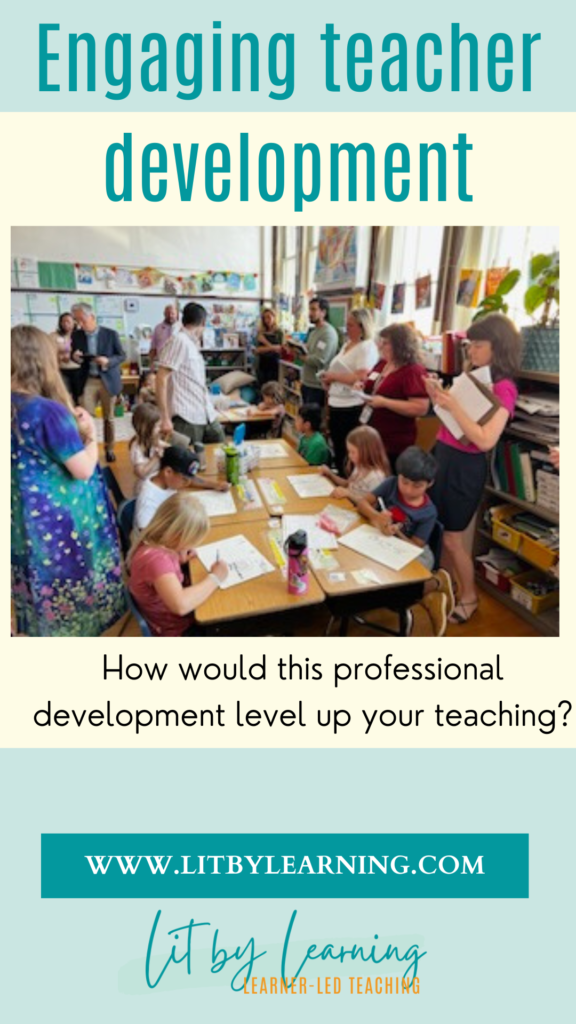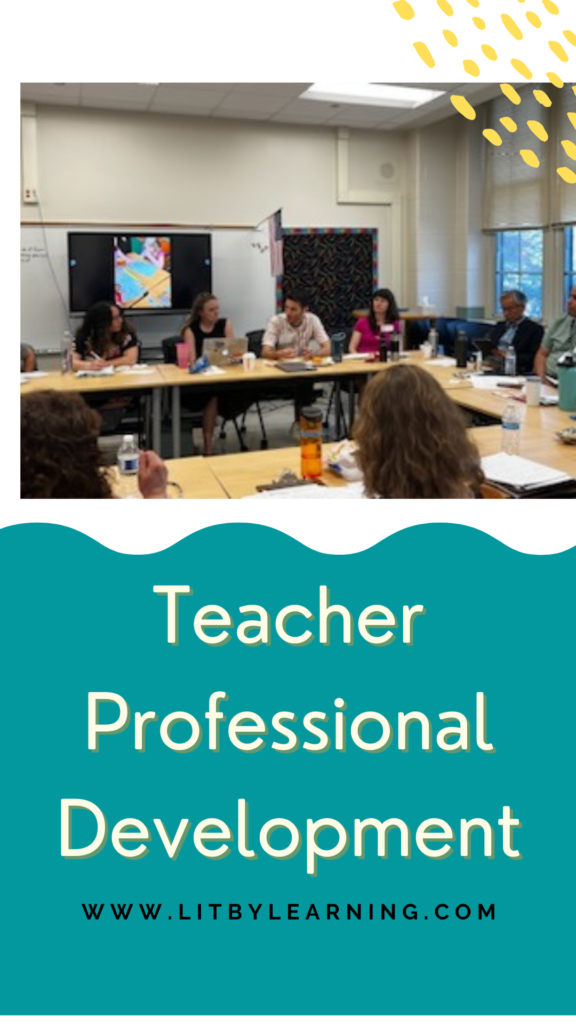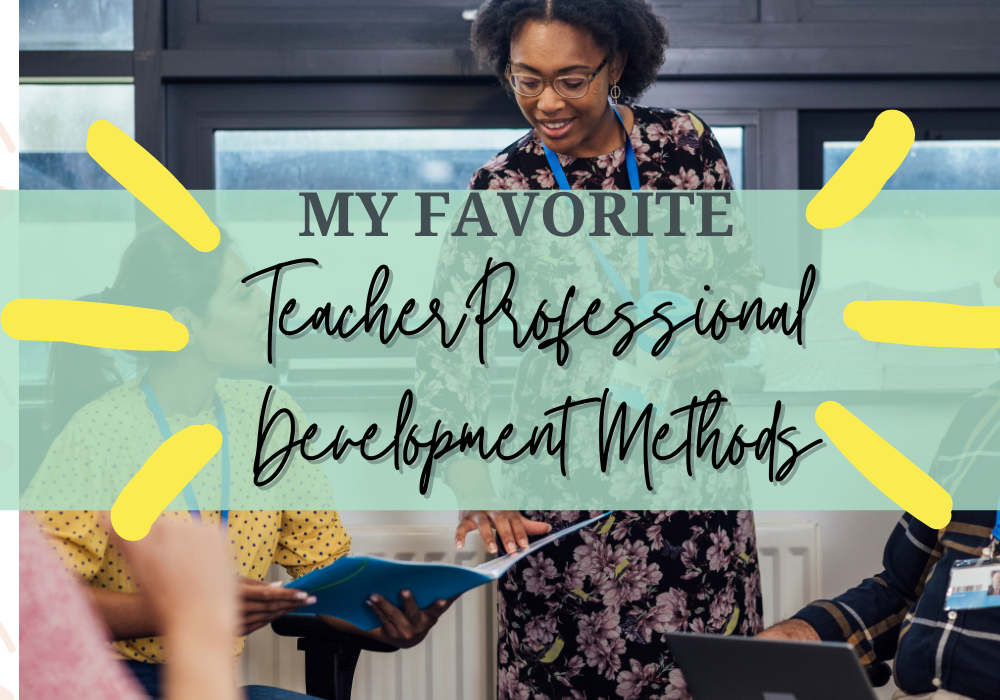What if professional development for teachers honored their expertise? If professional development was customized to the educator in the same way teachers seek to differentiate with students? What if professional development for teachers was… so much better?

Professional Development for Teachers
Teachers, is this relatable?
As the start of a new school year approaches, one can hear a collective groan emanating from teachers all over the country. They foresee what’s to come even before students walk through the doors: forced professional development.
The educators wonder what topics will be addressed this year and, more painfully, if they’ll have anything to do with their role at school. Itching to go to their classrooms to prepare for Day 1, the teachers will mask their anxiety any number of ways: doodling in the corners of yet another handout, furiously shaking their feet under the table, taking frequent water breaks.
Let’s get things straight here: I’m not anti-professional development.
Let’s get things straight here: I’m not anti-professional development. In fact, if you’ve been following Lit By Learning for any amount of time, you’ll hopefully have garnered that I love staying keeping up with the latest educational research and publications. I’m perpetually looking into new ideas that could better support the littles in front of me each day.
My issue: bad professional development
My problem, therefore, lies with bad professional development. Professional development that isn’t tailored to teachers and their expressed needs. My issue is that most professional development held in schools would be considered poor instruction in those same schools. Where’s the differentiation? How is this directly relevant to the students’ (in this case, teachers’) real lives? What strategies are being used to engage participants’ multiple modes of learning?
OK, rant over.
In my 14 years in the Chicago Public School system, I’ve sat through a LOT of wanting professional development sessions. That said, I’ve also engaged in two excellent, intriguing forms of professional teacher development. I’d love to tell you about them below!
Professional Development for Teachers #1: Action Research
What would it look like if education research didn’t come only from textbook companies and politically-influenced bodies? What could happen if studies about effective pedagogical practices came from teachers themselves, from their own classrooms?
Action research: what is it??
Action research is all about conducting inquiries in real-time; that is, collecting data AS the “experiment” is going on. There are no control groups and, often, not many quantitative ways of measuring data. Instead, the focus is on qualitative – dare I say, anecdotal, research conducted by the teacher themself.
The term, “action research,” was coined in 1933 by Kurt Lewin to describe a scenario in which a researcher and participants collaborate to solve a specific problem.
Alexandra Overby, 2019
Choosing a question
Teachers engaged in Action Research choose a question relevant to their practice, usually about trying out a new (to them) strategy and measuring its effects on their pupils. Perhaps they want to study how daily math journals affect students’ use of the mathematical practices. Maybe they’re curious about how weekly discussion circles would affect students speaking and listening skills. Whatever the topic, the teacher gets to select a question is relevant to their classroom in real time.
My own action research project
When I engaged in an Action Research Leadership Institute, my greatest classroom struggle at the time was teaching writing. I was struggling to motivate my multilingual third graders to write in a way that truly expressed their knowledge and ideas. Narrowing my scope a bit, I decided that my research question would be about providing authentic audiences for our writing. What would happen to my students’ writing if they felt increasingly connected to their authentic audience?
Enacting action research
Once teachers have determined their research question, they engage with research to see how their idea has worked in other classrooms. They consider both formal studies and other educators’ action research papers to form a hypothesis.
Next, they develop a way to collect data in their classroom; a consistent way that they can note what they’re observing over time. Unlike in traditional research projects, teacher-researchers are encouraged to respond to data in real-time. As teachers observe the effects of their intervention/action, they adapt to make changes.
At the conclusion of the project, teachers write about their learning! This writing serves not only to cement their own learning but to share their research with other educators!

Professional Development for Teachers #2: Lesson Study
Lesson Study is a second method of professional development that will always have my heart.
What is Lesson Study?
Lesson Study is a Japanese-based method of teacher-centered research in which a team cycles through planning, observing, and reflecting on co-planned lessons.
The Lesson Study Process
At the outstart, interested teachers gather and determine a lesson study theme. Similar to Action Research, Lesson Study participants choose their focus based on a current problem they encounter in their classroom. From there, the teaching team engages in a process known as kyozaikenkyu, which literally means, “the study or investigation (kenkyu) of instructional materials (kyozai).” During this process, teachers take a deep dive into their chosen topic. They examine how the subject matter is taught in varying curricula. They also read current research about the topic with a focus on overarching concepts and fundamental understandings students will need to engage with the lesson.

From there, teachers designate a “focus lesson” and a surrounding unit plan. The focus lesson is an especially intriguing session where new learning is introduced for students; a lesson where a lot of concepts – and misconceptions!- are likely to arise.
One of the teachers in the planning group volunteers or is chosen to present the lesson. This is done live, in front of their own students and with observers including the rest of the planning team, other interested parties, and a knowledgeable other to observe. Observers take notes and capture data as the lesson proceeds, making sure to center their notes around the team’s designated theme and line of questioning.
After the lesson is complete, all the observers meet to debrief what they observed. Their role is to evaluate the structure of the lesson, not the specific teacher who taught it. As a conclusion, the knowledgeable other shares their thoughts, often incorporating bigger ideas and recent research into the discussion.
Read much more about Lesson Study here!
What these teacher-centered professional development models have in common
Constructing this blog entry has helped me see just how many similarities there are between the Action Research and Lesson Study models of teacher professional development. First, they are completely teacher-directed. Teachers themselves get to choose what they’re studying; there’s an implied trust in this that reinforces the true professionalism of teaching. Second, both models are collaborative in nature. They aim for teachers to co-create learning together.

Read more about these teacher professional development models!
- Check out this Edutopia article entitled “How Teachers Can Learn Through Action Research.”
- Head over to the Lesson Study Alliance! You’ll get more info about Lesson Study and can even search a database of Lesson Study Reports.


